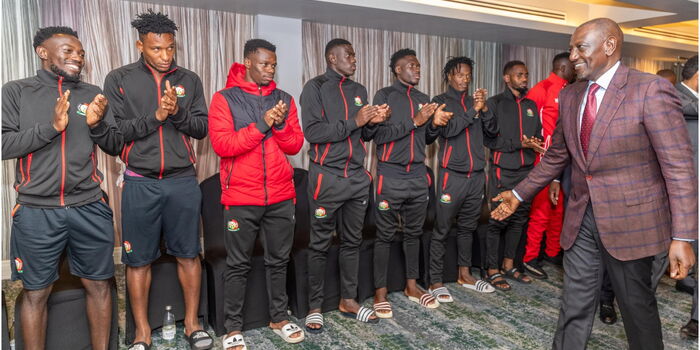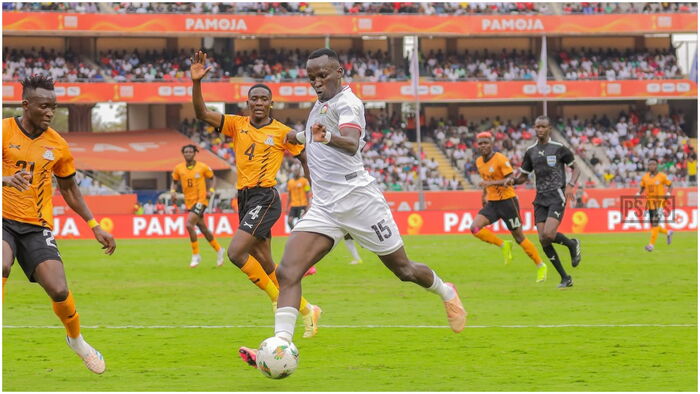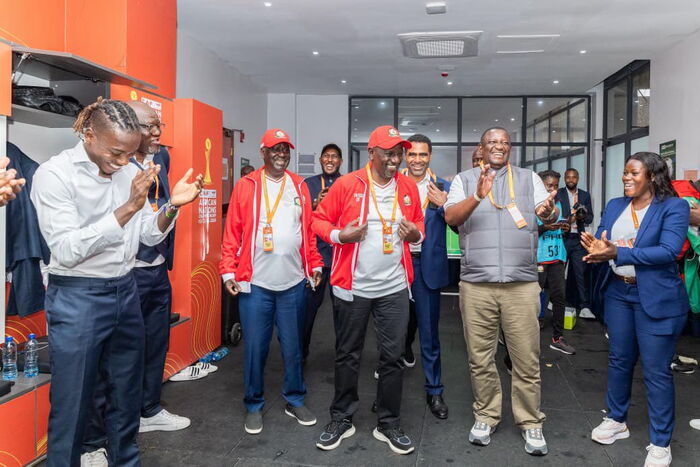The Harambee Stars are living a dream many young Kenyans only imagine. But with that dream has come fame, money, and pressure that is changing their lives forever.
Phones are buzzing non-stop, strangers are showing up with new stories, and suddenly, ordinary young men have become national celebrities. All of this began when President William Ruto rewarded the players with millions in bonuses after their stunning run to the quarter-finals of the African Nations Championship.
For 19-year-old Mansur Suleman, the rise has been both exciting and challenging. Speaking on Citizen TV on Sunday night, he admitted that sudden fame is not as easy as it looks.
“I get a lot of calls, but I stick to my principles. My closest friends and family are the people I focus on, the ones who have been with me through the struggle,” he said with a serious tone.
Suleman explained that fame attracts both genuine supporters and opportunists. “Fame brings all types of people, fake and real. If a new number calls me, I cannot pick up. Where were you when I was nobody? Now everyone wants a story.”
The young midfielder’s journey is inspiring. From playing for St. Anthony in Kitale to Rainbow FC and later joining KCB, his story reflects the struggle and determination of many Kenyan players. His breakthrough came when coach Benny McCarthy noticed his talent and gave him his first national call-up in March.
Suleman believes that McCarthy’s confidence, combined with support from teammates, is what has pushed him to deliver big performances on the pitch.
But Suleman is not alone in this journey. Attacker Boniface Muchiri, who also serves in the Kenya Defence Forces, spoke with pride about his unique position.
“Double feeling when I score and meet the President, because I serve my country both as a soldier and a player,” Muchiri said, smiling.
The players admit that Ruto’s million-shilling bonus has completely changed their mentality. While local league games often come with bonuses of only Ksh10,000, the promise of Ksh1 million in a single match has given them an unstoppable hunger to win.
“In local clubs, bonuses are Ksh10,000. But Ksh1 million in 90 minutes makes you give everything on the pitch,” Muchiri added.
The Stars also praised the better training facilities and the passionate fan base that has been cheering them on across the country. Many of them described coach Benny McCarthy not just as a coach but as a father figure, brother, and teammate all in one.
Winger Ben Stanley Omondi admitted that the pressure is real, especially when everything is at stake. He recalled the final group match against Zambia, where the team needed a win to avoid traveling to Tanzania for the next stage.
“But our goal is to win so the cup stays at home. That would be our biggest happiness,” Omondi said.
That crucial match was sealed by Ryan Ogam’s late strike, a goal that lifted the entire nation. With only 15 minutes left, Ogam ensured Kenya finished top of a tough group that included Morocco, Angola, and the Democratic Republic of Congo.
The celebrations were wild, but the focus quickly shifted. Kenya is now preparing to face Madagascar in the quarter-finals, a game that will be played on home soil. The players know that the eyes of the nation are watching, and the pressure is even greater.
Suleman and Muchiri both said their dream is to play abroad. They believe that with McCarthy’s guidance and the exposure of this tournament, doors will soon open in Europe or other international leagues.
Beyond money and fame, the players see themselves as role models. They want young boys in Kitale, Kibera, and Kisumu to look at them and believe that football can change lives.
“Fame and money are good, but the biggest win is inspiring the next generation of Kenyan footballers,” Suleman concluded.
For the Harambee Stars, this is more than just a football journey. It is a story of hope, resilience, and the belief that Kenya can rise on the continental stage and beyond.






